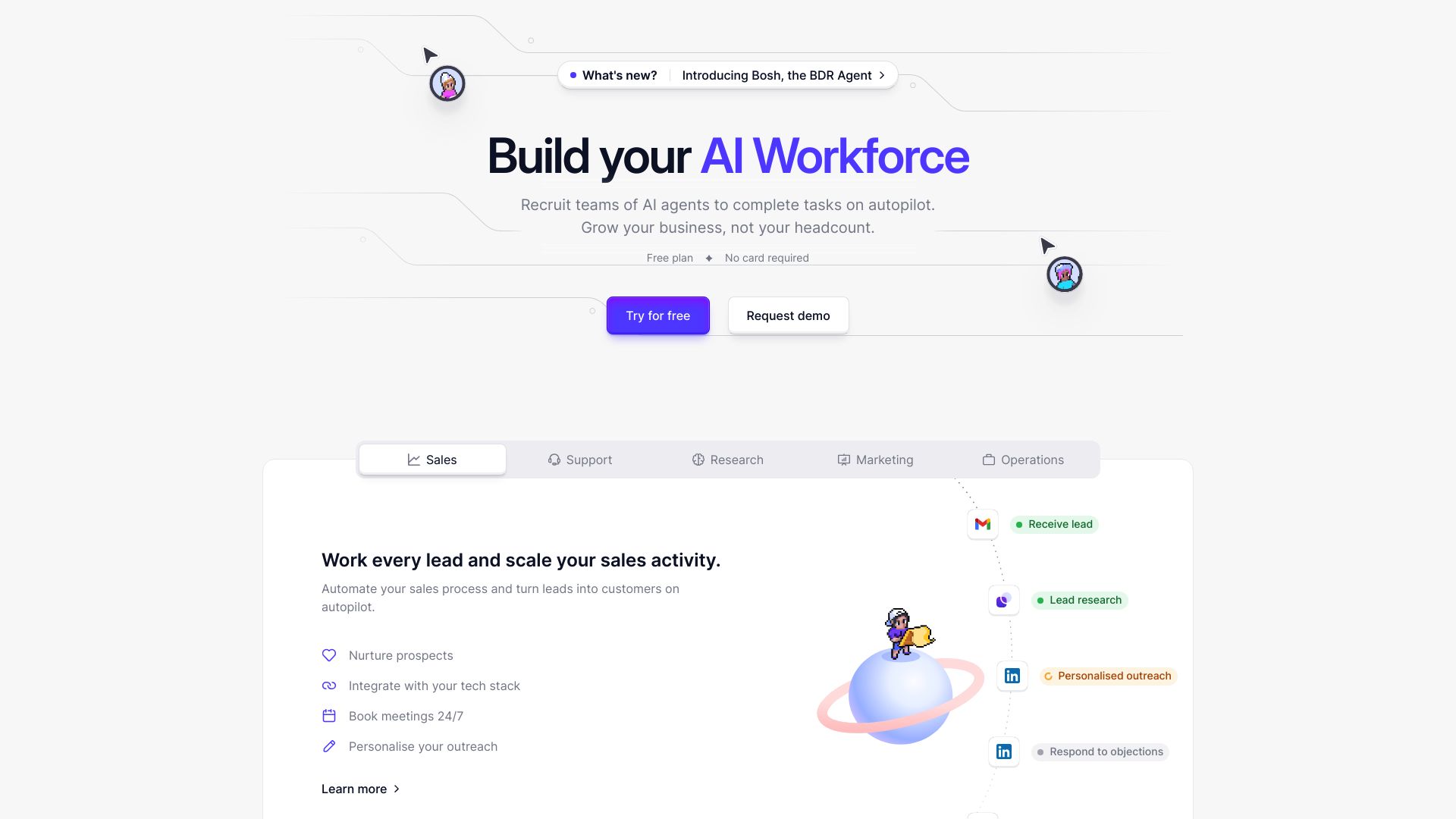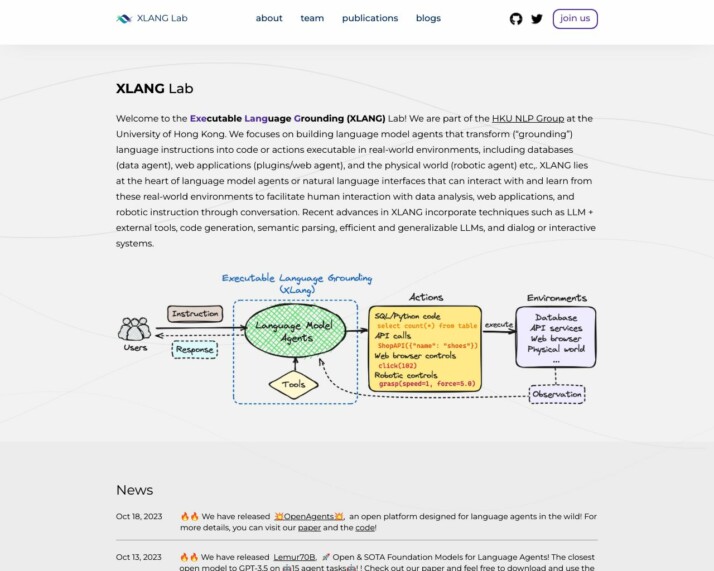Relevance AI vs. OpenAgents: Comparing AI Development Platforms
AI-powered agents and platforms are revolutionizing how businesses operate, automate tasks, and analyze data. This review compares Relevance AI vs. OpenAgents, and SmythOS, three innovative solutions in the AI development space. We’ll explore their key features, strengths, and limitations to help you choose the best tool for your needs. Whether you’re a developer seeking powerful APIs, a business leader focused on scalability, or a non-technical user looking for accessible AI solutions, this comparison will guide you through the capabilities of each platform. Discover how these tools can enhance your workflows, boost productivity, and unlock new possibilities in AI-driven automation and analysis.
Relevance AI Overview
Relevance AI offers a low-code platform for building and deploying Large Language Model (LLM)-powered AI agents and tools. The platform caters to users with varying levels of technical expertise, from developers to business professionals seeking to integrate AI capabilities into their workflows.
Relevance AI emphasizes rapid development, typically enabling users to create custom AI agents and tools within minutes. The platform’s multi-provider support allows integration and switching between various LLM providers, offering flexibility and adaptability in AI development.
Relevance AI offers a low-code platform for building and deploying Large Language Model (LLM)-powered AI agents and tools… enabling users to create custom AI agents and tools within minutes.


Key features of Relevance AI include a built-in vector store for efficient text storage and retrieval, enhancing data handling capabilities. The platform’s ’Magic Deployment’ feature offers a fully managed service for deploying LLM features, eliminating concerns about infrastructure and scaling. Additionally, Relevance AI provides a type-safe and flexible SDK for building applications with LLM features.
The platform supports a wide range of functionalities, including customizable AI assistants, AI-powered tools for data analysis and task automation, and ready-to-use templates for common tasks. Relevance AI also offers robust data management capabilities, supporting various data formats and providing powerful data processing and storage options.
While Relevance AI offers a comprehensive suite of features, users should consider potential limitations such as the learning curve associated with leveraging advanced features and the need for careful management of data privacy and security when handling sensitive information. The platform’s effectiveness in complex enterprise environments may require thorough evaluation to ensure seamless integration with existing systems and workflows.
OpenAgents Overview
OpenAgents introduces a versatile platform for integrating AI agents into everyday life. The system revolves around three primary agents: Data Agent, Plugins Agent, and Web Agent.
The Data Agent excels in data analysis, simplifying complex tasks related to searching, handling, and visualizing data. Marketing professionals and data analysts benefit from its ability to process large datasets and generate actionable insights efficiently.
The Plugins Agent stands out as a highlight of the OpenAgents platform, boasting integration with over 200 plugins. This extensive library enables the agent to handle a wide array of daily tasks, from checking weather forecasts to facilitating online shopping and accessing scientific data. The sheer diversity of these plugins makes the agent highly adaptable to various user needs.


The Plugins Agent stands out as a highlight of the OpenAgents platform, boasting integration with over 200 plugins. This extensive library enables the agent to handle a wide array of daily tasks…
The Web Agent employs a Chrome extension to automate web browsing, streamlining the online experience. It navigates and explores websites autonomously, making information retrieval and resource access more efficient. This agent’s ability to interact with web content independently sets it apart in the realm of AI-assisted internet usage.
OpenAgents emphasizes user-friendliness with its web UI and backend server, facilitating easy communication with the agents. This approach makes the platform accessible to non-expert users while still offering powerful capabilities for more advanced applications. The system’s adaptability allows for deployment on localhost and the integration of new agents and plugins, providing flexibility for various use cases.
While OpenAgents offers impressive features, users should consider potential limitations in scalability and customization options compared to some enterprise-level solutions. Additionally, the platform’s reliance on third-party plugins may introduce compatibility or maintenance challenges over time. Despite these considerations, OpenAgents presents a compelling option for those seeking to integrate AI agents into their daily workflows and tasks.
Feature Comparison
Relevance AI and OpenAgents offer distinct approaches to AI agent development, with some key differences in their feature sets. Relevance AI provides a low-code platform focused on rapid development of LLM-powered AI agents and tools, while OpenAgents centers around three specialized agents for data analysis, plugin integration, and web browsing.
In terms of core components, Relevance AI’s visual builder and no-code editor enable quick creation of custom AI agents, catering to users with varying technical expertise. OpenAgents, on the other hand, offers pre-built agents with specific functionalities, potentially limiting customization options but providing ready-to-use solutions for common tasks.
Security features represent another area of divergence. Relevance AI emphasizes data encryption and OAuth support, crucial for enterprise-level deployments. OpenAgents’ documentation does not explicitly highlight advanced security measures, which may be a consideration for users handling sensitive data or requiring robust access controls. This gap in security features could be a significant factor for organizations prioritizing data protection and compliance.
Feature Comparison Table
| Relevance AI | OpenAgents | SmythOS | |
|---|---|---|---|
| CORE FEATURES | |||
| Visual Builder | ✅ | ❌ | ✅ |
| No-Code Options | ✅ | ❌ | ✅ |
| Explainability & Transparency | ❌ | ✅ | ✅ |
| Multi-Agent Collaboration | ❌ | ✅ | ✅ |
| Audit Logs for Analytics | ❌ | ✅ | ✅ |
| Work as Team | ❌ | ✅ | ✅ |
| Agent Work Scheduler | ✅ | ❌ | ✅ |
| SECURITY | |||
| Constrained Alignment | ❌ | ❌ | ✅ |
| IP Control | ❌ | ❌ | ✅ |
| COMPONENTS | |||
| Huggingface AIs | ❌ | ✅ | ✅ |
| Zapier APIs | ❌ | ✅ | ✅ |
| Data Lakes | ❌ | ❌ | ✅ |
| DEPLOYMENT OPTIONS (EMBODIMENTS) | |||
| Staging Domains | ✅ | ❌ | ✅ |
| Production Domains | ✅ | ❌ | ✅ |
| Deploy as Scheduled Agent | ✅ | ❌ | ✅ |
| DATA LAKE SUPPORT | |||
| Hosted Vector Database | ✅ | ❌ | ✅ |
| Sitemap Crawler | ❌ | ❌ | ✅ |
| YouTube Transcript Crawler | ✅ | ❌ | ✅ |
| URL Crawler | ❌ | ✅ | ✅ |
Best Alternative to Relevance AI and OpenAgents
SmythOS stands out as the superior alternative to Relevance AI and OpenAgents, offering a comprehensive platform for AI agent development and deployment. We’ve designed SmythOS to address the limitations of other platforms while providing unparalleled flexibility and ease of use.
Our visual builder and no-code options make AI agent creation accessible to users of all skill levels. Unlike Relevance AI’s limited customization and OpenAgents’ pre-built agents, SmythOS allows for unlimited use cases through its drag-and-drop interface and extensive integration ecosystem. This flexibility enables users to create tailored AI solutions for any business need, from customer service chatbots to complex data analysis tools.
SmythOS allows for unlimited use cases through its drag-and-drop interface and extensive integration ecosystem.
Security is paramount in AI development, and SmythOS excels where others fall short. We offer robust data encryption, OAuth support, and IP control features, ensuring your AI agents operate in a secure environment. This level of protection is crucial for enterprise-level deployments and sets SmythOS apart from platforms like OpenAgents, which lack explicit security measures.
SmythOS’s feature set goes beyond basic agent creation. We support multi-agent collaboration, allowing teams of AI agents to work together on complex tasks. Our platform also includes advanced capabilities like constrained alignment, ensuring AI behavior aligns with organizational goals and ethical guidelines. These features, combined with our support for various AI models and extensive API integrations, provide a level of sophistication and versatility unmatched by Relevance AI or OpenAgents.
SmythOS’s feature set goes beyond basic agent creation. We support multi-agent collaboration, allowing teams of AI agents to work together on complex tasks.
With SmythOS, we’ve created a platform that not only meets current AI development needs but also scales for future demands. Our hosted vector database, support for diverse data sources, and flexible deployment options enable users to build and manage AI agents that grow with their business. By choosing SmythOS, you’re not just selecting an AI agent builder – you’re investing in a future-proof solution that will drive innovation and efficiency across your organization.
Conclusion
Relevance AI and OpenAgents offer compelling AI solutions, each with unique strengths. Relevance AI’s low-code platform excels in rapid development of LLM-powered tools, while OpenAgents provides specialized agents for data analysis, plugin integration, and web browsing.
Relevance AI’s visual builder and no-code editor empower users with varying technical expertise to create custom AI agents quickly. This flexibility, combined with multi-provider support and a built-in vector store, makes it a strong choice for businesses seeking adaptable AI solutions. However, its enterprise-level focus may present a steeper learning curve for some users.
OpenAgents shines with its plugin-rich environment and autonomous web browsing capabilities, offering practical AI assistance for everyday tasks. Its user-friendly interface makes it accessible to non-experts, but potential limitations in scalability and customization may not suit all enterprise needs.
While both platforms have their merits, SmythOS emerges as the superior choice, offering unparalleled versatility and power. Our drag-and-drop interface simplifies complex AI workflows, making advanced capabilities accessible to users of all skill levels. With support for over 300,000 integrations and compatibility with leading AI models, SmythOS provides unmatched flexibility in creating and deploying AI agents.
SmythOS’s ’Create Once, Deploy Anywhere’ approach sets it apart, allowing seamless integration across various platforms and services. This versatility, combined with robust features like multi-agent orchestration and extensive deployment options, positions SmythOS as the ideal solution for businesses looking to harness the full potential of AI.
Ready to experience the future of AI development? Explore our diverse range of AI-powered agent templates and start building with SmythOS today. Unleash the power of AI for your business and join the economic revolution – create your free SmythOS account now and transform your workflow with intelligent agents.
Last updated:
Disclaimer: The information presented in this article is for general informational purposes only and is provided as is. While we strive to keep the content up-to-date and accurate, we make no representations or warranties of any kind, express or implied, about the completeness, accuracy, reliability, suitability, or availability of the information contained in this article.
Any reliance you place on such information is strictly at your own risk. We reserve the right to make additions, deletions, or modifications to the contents of this article at any time without prior notice.
In no event will we be liable for any loss or damage including without limitation, indirect or consequential loss or damage, or any loss or damage whatsoever arising from loss of data, profits, or any other loss not specified herein arising out of, or in connection with, the use of this article.
Despite our best efforts, this article may contain oversights, errors, or omissions. If you notice any inaccuracies or have concerns about the content, please report them through our content feedback form. Your input helps us maintain the quality and reliability of our information.
